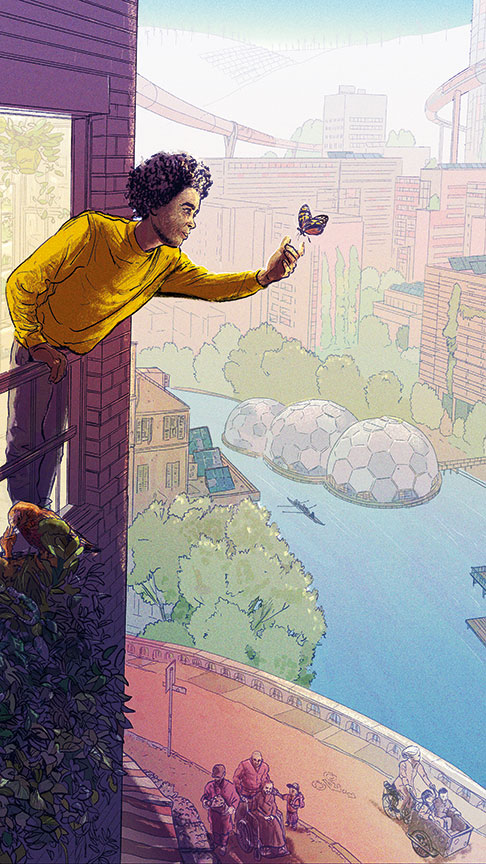A guest article by Mojib Latif
A complete reorientation
How water use, mobility and energy production could help rather than harm the environment – and why this would require a cultural revolution.
“Man must explore himself – his goals and values – as much as the world he seeks to change,” is what the Club of Rome wrote in “The Limits to Growth”. With their report, published in 1972, the Club’s founders wanted to encourage people to question the narratives they believed in and followed. And yet to this day we have closed our eyes to the fact that the way we live on Earth risks dramatically worsening the conditions for life on our planet. “A decision to do nothing is a decision to increase the risk of collapse. […] if the global society waits until those constraints are unmistakeably apparent, it will have waited too long,” claims the report that appeared half a century ago. We have now reached this point.
A great deal of knowledge about the challenges has been acquired around the world in the meantime and solutions have been developed. However, we must concede that we are still a long way from seeing the kind of transformation that is so urgently needed. What still appeared abstract and far away 50 years ago is already shaping the reality of our lives today: species extinction and global warming are just two symptoms of how the so-called planetary boundaries have been crossed. The concepts that are still being followed, by industrialised nations at least, mean that we are focusing our attention on growth in gross domestic product. We too often pursue illusory values rather than recognising true values such as altruism or peace.
In particular, we fail to recognise the value that an intact environment and stable ecosystems have for civilisation. Yet rather than preserving these systems, we have ensured through our actions that the Earth’s capacity to support life has declined. We should therefore adopt a new approach to the concept of sustainability: it is no longer a question of preserving what we have, but of increasing the planet’s biocapacity again.
That is why the German Association for the Club of Rome is committed to a future that will support life, and to a complete reorientation of the way we think and act that will involve us embracing a constructive and regenerative economy and a social system in which strengthening our ecosystems, society and humankind are the criteria that guide us. It is about nothing less than values such as empathy, humility, respect, appreciation for life and for that which creates life.
„We should at last begin questioning and redefining our goals and values. After all, people must also really want these changes.“
Good approaches do exist. Take the city of Rotterdam, for example. It recently adopted nature-inclusive planning as the guiding philosophy for its development. Seven major projects are to create areas that will provide animals with opportunities for refuge, nesting and movement. Naturally, these spaces will also allow people to come together. Life-supportive cities, that is to say cities that are committed to life and vitality, are thus not only greener and more peaceful; they also have cleaner air and do not heat up so much on hot days. We must develop the concept of cities designed for people. The concept of cities designed for cars was a fatal error.
Technological innovations in all areas are essential for a life-supportive future. Any kind of waste product, be it greenhouse gases such as CO2, plastic waste or electric waste, is evidence of how we are squandering resources. We must transform the way we live to create a circular economy. How can we change our water use, mobility, energy production, resource consumption or food to make it not only less harmful but actually regenerative and, ideally, life-supporting, i.e. strengthening the environment? We also need societal innovations, in
areas such as education, health and nursing care, and integration and participation – that is to say equal opportunities.
We should take the advice given in “The Limits to Growth” and at last begin questioning and redefining our goals and values. After all, people must also really want these changes, which is why we need not only innovations on the “outside”, but also on the “inside”. Or, as Club of Rome co-founder Aurelio Peccei wrote in “No limits to learning” in 1979: “Any solutions can be sought nowhere else but within ourselves.” Peccei described this search as nothing less than a cultural revolution or an adventure of the spirit. Is this not more vital
than ever against the backdrop of continued environmental destruction, increasing hunger and migration, growing social inequality or the numerous military conflicts such as Russia’s attack of Ukraine? —
Professor Mojib Latif is head of the research unit Marine Meteorology at GEOMAR Helmholtz Centre for Ocean Research in Kiel. The well-known climate scientist has been president of the German Association for the Club of Rome since 2017. A former DAAD grantee, he was responsible for project-related personal exchange between the Max Plank Institue for Meteorology, Hamburg, and the University of Oxford from 1995 to 1999.
THE ILLUSTRATION
The best of all worlds: energy comes from renewable sources, and mobility is green and efficient. People live in houses covered with greenery, providing space for biodiversity in harmony with nature. Vertical gardens and micro farms support food production and ensure short supply chains to local shops. In addition, the plants keep the air clean and cool buildings naturally. Floating hemispheres inspired by the Rotterdam model provide additional living space on water – a scenario that could really come into its own if sea levels rise further as a result of climate change. People live together in inclusive communities in which everyone has the chance to participate.
The illustrator Florian Bayer is well known for his editorial and book illustrations and has won a number of awards for his work. He teaches at the University of Applied Sciences in Würzburg.


